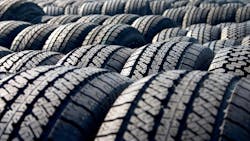Truck tires are a global business. When imported merchandise such as tires appear to be subsidized by a foreign government and sold at less than fair value, the U.S. International Trade Commission can step in. The federal agency investigates imported products claimed to injure a domestic industry and determines if the government should impose a duty or tariff. Since 2019, truck tires imported from China have been subject to a tariff after a USITC investigation revealed they were subsidized and sold below cost.
In October 2023, a similar claim was made against truck tires manufactured in Thailand, and the ITC opened an investigation the following month. Its preliminary determination was released late last year.
The ITC studied the domestic and imported truck tire markets from January 2020 through June 2023. It found that through 2022, Thai imports increased 8.8%, reaching 28.3% of the total U.S. truck tire market share.
During that same period, the domestic share declined from 46.4% in 2020 to 41.1% in 2021 and 33.9% in 2022. At the start of this decade, Vietnam, Japan, China, Canada, and South Korea were the largest sources of imported truck tires outside Thailand. Their collective market share increased from 34.1% in 2020 to 34.7% in 2021 and 37.9% in 2022.
The ITC determined in a December 2023 report that imported truck tires from Thailand “had a significant impact on the domestic industry.” The report also revealed that while U.S. tire consumption increased by 47% between 2020 and 2022, low-priced tires from Thailand “prevented the domestic industry from fully capitalizing on the increase as they captured market share from the industry.” The preliminary determination by the ITC concluded that there was a “reasonable indication that an industry in the U.S. was materially injured” by truck tires imported from Thailand and sold for less than fair market value.
See also: Product Spotlight: Latest in truck tires for 2024
In May, the U.S. Department of Commerce announced its preliminary determination regarding the Thai truck tires. Surprisingly, the lone Thailand manufacturer that participated in the USITC preliminary determination was determined to be exempt from any dumping rates. At the same time, Bridgestone Corporation and all other companies manufacturing truck tires in Thailand were given a 2.35% tariff.
Considering the original petition from the United Steelworkers Union alleged dumping margins as high as 47.8%, a 2.35% duty is a head-scratcher. The continued loss of domestic market share indicates that the U.S. industry is harmed, while the continued increase in truck tire imports from Thailand appears to support that position. Commerce is scheduled to issue a final determination by July 29, with the ITC final determination scheduled for Sept. 12.
One argument against tariffs on truck tires imported from Thailand is that domestic manufacturing generally focuses on Tier 1 and Tier 2 tire suppliers. These name-brand tires are made for original equipment manufacturers and larger fleets. It’s been claimed that tires imported from Thailand and other offshore entities do not compete with those markets. Tier 3 and Tier 4 tires are generally targeted at owner-operators and small independent fleets, where price is a primary factor when deciding whether to purchase a truck tire.
Another point in the recent ITC determination working against tariffs is that the domestic industry’s financial performance generally improved since 2020. Gross profit, operating income, and net income all increased through 2022. Domestic hourly wages and total hours worked were higher in 2022 than in 2020, but productivity was lower. It’s not the type of data that reflects an injury to an industry, which may help explain the surprising announcement from the Commerce Department.
Tier 1 and Tier 2 customers will continue to focus on the total ownership cost as they strive for the lowest cost per mile. The long-wearing tread compounds and high-quality casings create the best value for fleets because they are the foundation for a quality retread program. On the other hand, the price buyers of Tier 3 and Tier 4 tires are not concerned with original mileage or casing life. They are just trying to operate with tires with legal tread depth for the lowest possible price.
In any case, there is an apparent disconnect between the ITC and the Commerce Department regarding the impact of tires imported from Thailand on the U.S. truck tire market.
About the Author
Kevin Rohlwing
Kevin Rohlwing is the SVP of training for the Tire Industry Association. He has more than 40 years of experience in the tire industry and has created programs to help train more than 180,000 technicians.
